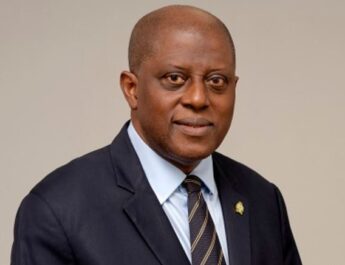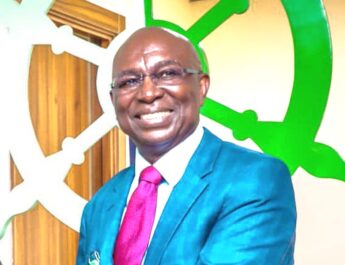The Nigeria Customs Service (NCS) swims in the euphoria of its new found innovation for the clearance of overtime cargoes in the ports
By Innocent Chukwu
Part of the Nigeria Customs Service’s (NCS) management team led by its Comptroller General (CGC) Adewale Adeniyi, appeared with pomp and pageantry on Monday, September 15, 2025 at the main hall of the Apapa Area 1 Command. It was the unveiling cum the stakeholders’ sensitisation forum on the NCS latest innovation in the clearing processes for overtime cargoes which would replace the hitherto manual procedure.
Stakeholders drawn from the clearing and forwarding community, importers, shipping companies, Customs officers and the media jam-packed the auditorium to have a firsthand information on the innovative venture as expert officers took the audience through the rigorous path to getting overtime cargoes out of the port using the new Electronic Clearing Portal. The lectures were smooth, interesting and revealing with those in the audience listening with rapt attention.
At the end of the tutorials, stakeholders were given the floor to respond to what they were exposed to through questions, contributions and words of advice to the host NCS.
Giving his keynote address, the Assistant Comptroller General (ACG) in charge of the Headquarters, Isah Umar, noted that the electronic clearing system would be useful to the Service in simplifying clearance process, ease of doing business, transparency of process, and Data integrity.
Speaking earlier on the benefits of the automated overtime cargoes clearance system, Umar said that the Nigeria Customs seeks to benefit from the deployment of the Overtime E-clearance System in terms of simplified clearance. Other benefits he listed from the system included electronic records of disposal, reduced human interaction, automated records of disposals, improving import/export data integrity, streamlined processes and procedures for the disposal of overtime cargo, establishment of a harmonious and automated document flow.
Umar said the automated process would eliminate any form of breach of procedure or disposal of overtime cargo that has not exhausted its dwelling period.
The Comptroller General of Customs said in order to ensure simplified clearance processes, ease of doing business, and transparency in the disposal of overtime cargoes, the Service has to automate all clearing processes of overtime cargo across all ports in Nigeria.
Adeniyi disclosed this at the sensitization of the stakeholders on the new system. He said that the automation process was imperative because more than 50 per cent of the letters, emails, and complaints being received on his table a daily basis, have to do with the management of overtime cargoes.
The Customs boss also said that a special desk has been created at the Customs Headquarters in Abuja, in order to prioritise project cargoes being imported by government agencies. He assured that the essence of automating the process was not for revenue generation, but to ensure efficiency in the cargo clearance process.
At the event, Adeniyi said, “Our objective is not about making revenue, our objective for deploying these systems includes to facilitate trade, to get imported goods to their owners. But more importantly, we want to manage space so that other imports that are coming can have space in our ports and then they can be cleared in a very swift manner.
“So this system will be deployed and we will appreciate the feedback that we are going to be getting from our stakeholders.
“What this means is that all of these challenges that bedevils the process of management of overtime cargo are real, and they have to be confronted.
We are more interested in exiting these cargoes from our ports, rather than managing them as overtime.
“One of the things that I have done was to set up specialized desks at headquarters and in different commands to manage imports done by government and government agencies. We don’t want those imports to stay one day longer.
“Projects that address issues of power infrastructure, road infrastructure, public health, education, all of those projects are very vital to delivering on dividends of democracy to Nigerians and we would not want them to be abandoned in the ports, to stay longer in our ports. And irrespective of their status, the directive I always give to all our Controllers is that we must weigh all processes and procedures and ensure that those consignment are taken out of our ports.

“The same goes for consignment imported by members of the Organized Private Sector and the Manufacturers’ Association of Nigeria and other organized groups.
“We know that through these imports, they reflect our economy, and we don’t want them to be delayed in our port. We also give reference to our embassies and consignment that are imported by international organizations, missions, and diplomatic agencies.
“So, we also have special desks that have been created for them. So, I need to state it here for Nigerians. I need to reiterate and reemphasize the fact that revenue is not the aim, is not the objective of what we are doing.
“We have the objective of injecting transparency, of reducing corruption, of making the system more efficient. The objective that we do not have in mind in putting this system is revenue. And I’ll just give you an example. In 2024, our revenue profile rose to N6.3 trillion, less than one per cent of that was from overtime cargoes.”
The Customs boss, therefore, assured the public that the sensitization will continue, as there would be an interaction and consultation with terminal operators and shipping companies, especially as it concerned demurrages and rents on overtime cargoes.
“I will direct the Zonal Coordinator to organize more of these platforms starting from this week. Specifically, we will be targeting terminal operators and shipping companies first.
We will also do the same thing in all the commands, and then the Customs agents” he assured.




